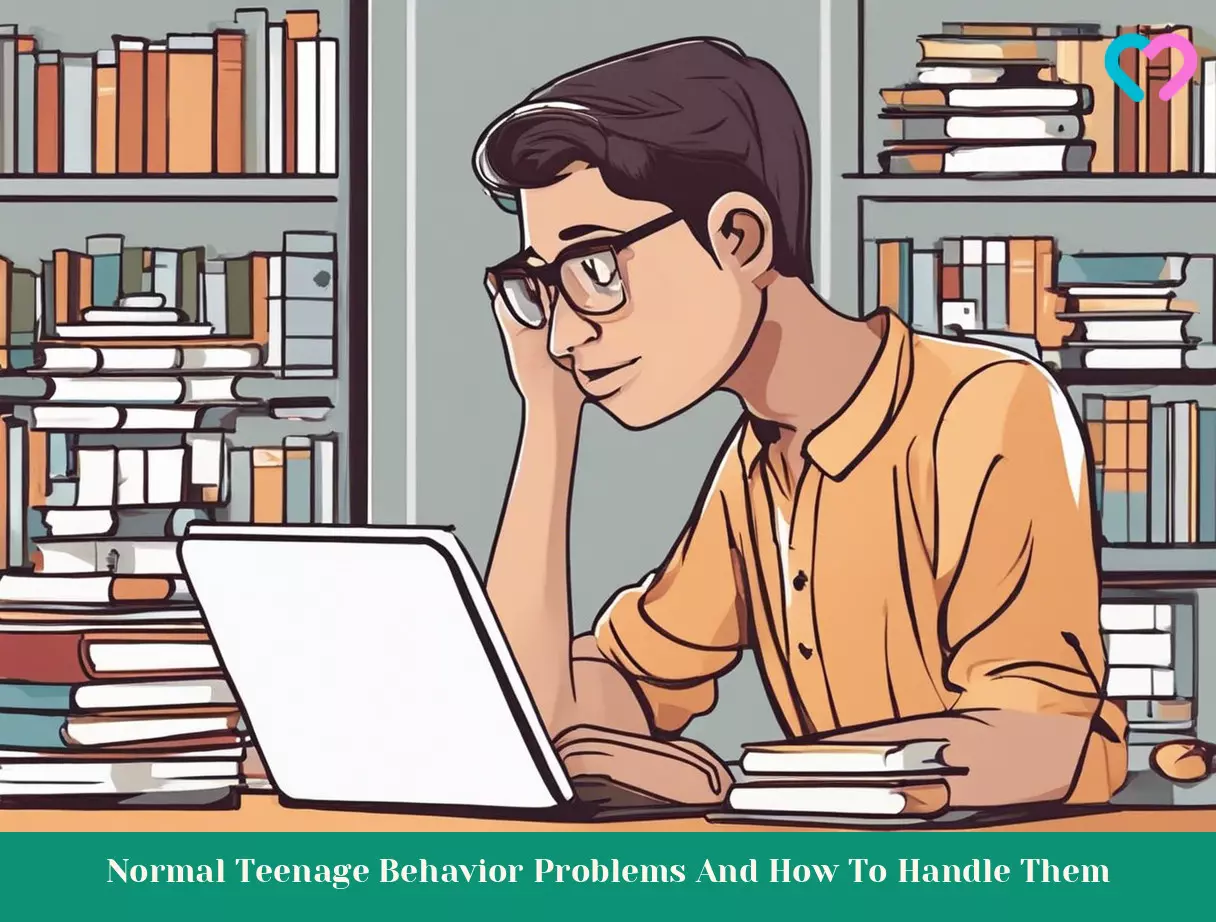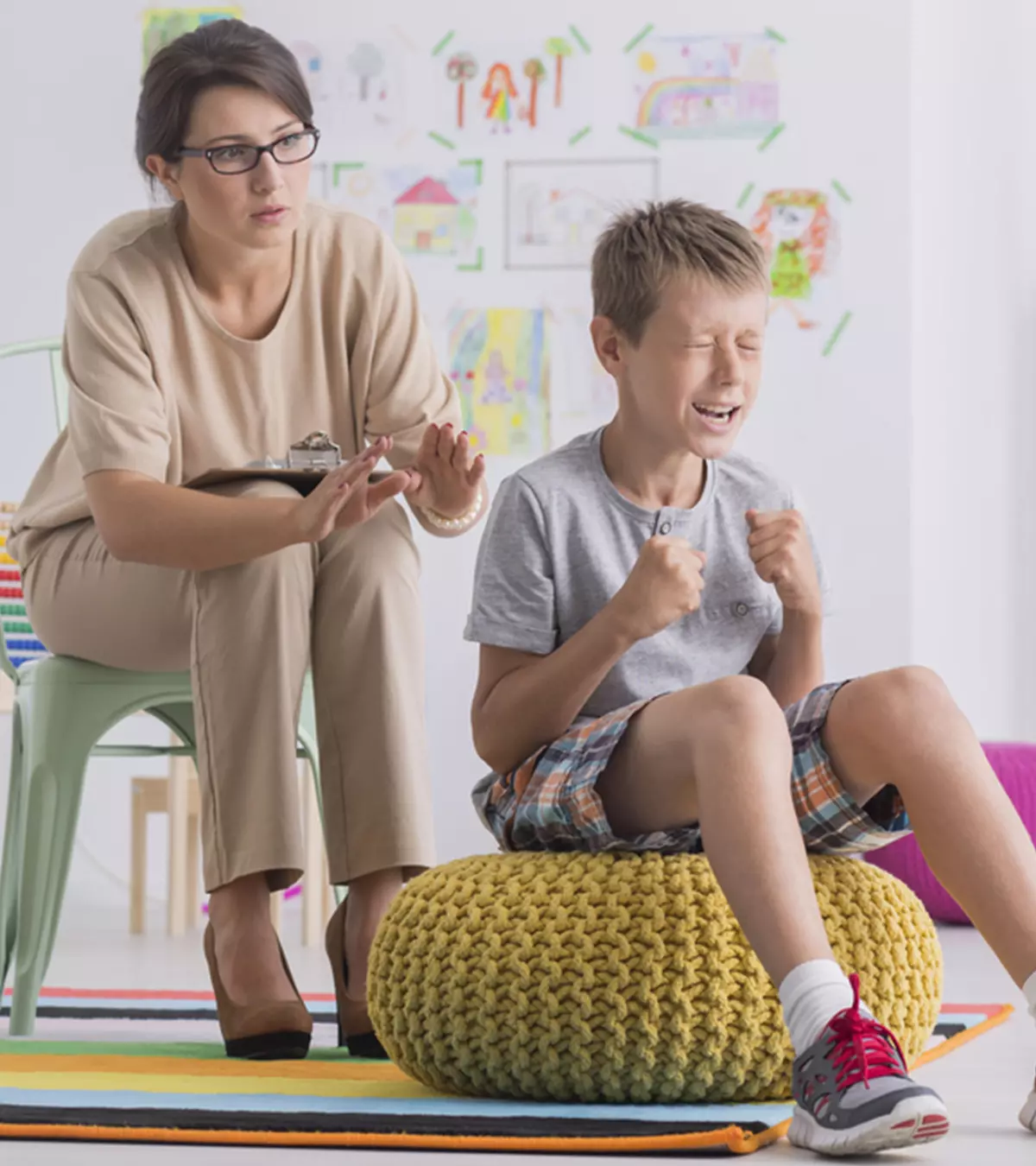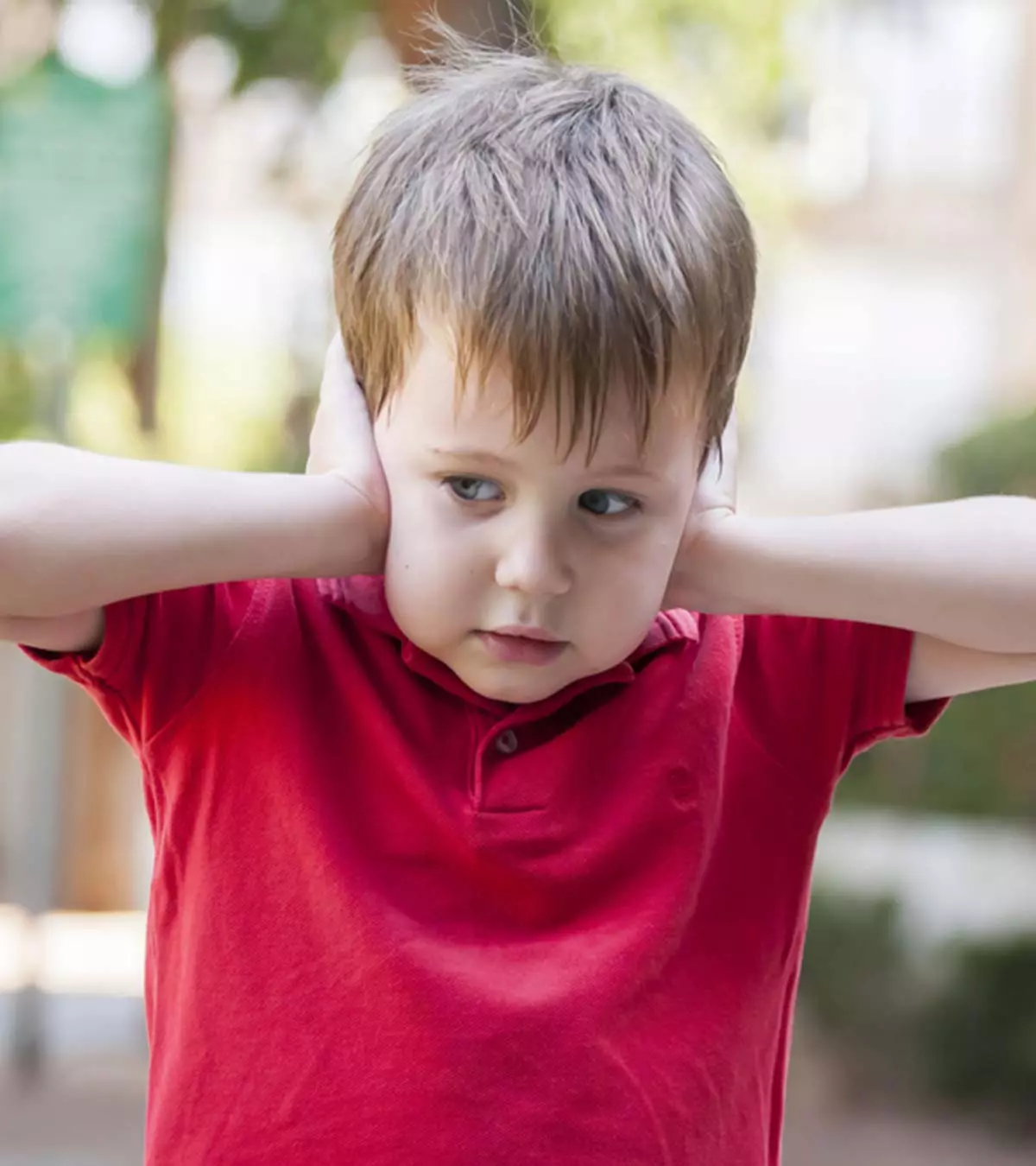
Image: ShutterStock
It’s not easy dealing with teenage behavior. When it comes to your teenager, no matter how amazing a parent you are or how fantastic your relationship with your children is, you are bound to run against parenting barriers. Teenagers have a lot of behavioral issues. However, if you are prepared to put in effort to understand their needs and what they are going through, you will have no trouble dealing with them. This post provides insight into teenage behavioral issues and how to cope with them without putting your relationship with your child at risk.

Key Pointers
- Adolescents exhibit typical behavioral challenges, which can be addressed by understanding their needs and challenges.
- Teenagers may engage in harmful behaviors, such as substance abuse, unsafe sexual practices, and excessive technology use.
- Teenage girls are susceptible to stress and have an increased likelihood of encountering eating disorders, anxiety disorders, and substance abuse.
- Teenage boys tend to suppress their feelings, start using drugs and drinking early, and have reckless personalities.
- To manage teen behavior, it is recommended to build trust, empathize, respect, offer help, and show that you care.
What Is Normal Teen Behavior?
“Is my teenager’s behavior normal?” If you often ask yourself this question, you are not alone. Parents could have difficulty understanding how their lovable little girl or boy has become so inscrutableiDifficult to understand or interpret . It is normal for teenagers to be moody, because of the hormonal changes they go through. The changes happening to the neural pathways in their brain and the ongoing growth of their body. Whilst many teens appear to be of the same size as adults, they still do not have the same lung capacity and this adds to the changes going on in their brains, making them feel tired easily.
Your teenager may need several reminders to finish his homework, to keep his room clean, or to finish simple chores. They may seem defiant and distant, and even detached at times.
That is typical teen behavior, but it may seem abnormal to adults, making it difficult to differentiate between normal teenage behavior and behavior associated with a mental illness.
Factors That Affect Teenage Behavior
Adolescence is a phase characterized by hormonal, neurological, and social changes that shape how teenagers think, feel, and behave. Here are some common factors that could affect teenage behavior.
1. Hormonal shifts: Most girls hit puberty between 8 and 13 years of age, whereas for boys, it begins between 9 and 14 (1). However, it is normal for a child to enter puberty earlier or later. Puberty marks a period of significant hormonal changes that affect a teen’s emotions, impulses, and moods.
2. Social changes: During adolescence, children become highly conscious of their appearance. They actively explore different aspects of themselves and their lives, including aspirations, beliefs, interests, and values, which makes them anxious about their identity. Peer relationships become increasingly important for teens and influence their behaviors and choices.
3. Neurological development: Teenage is characterized by neurological developments that may lead to aggressive and risk-taking behaviors. According to experts, teenagers engage in risk-taking behaviors to acquire new skills, gain peer affiliations, and develop social identity (2). They also suggest that the brain region that processes emotions, particularly aggressive behavior and fear, attains full maturity during adolescence. On the other hand, the logical frontal cortex, the area of the brain responsible for reasoning, is still immature. It is why teens often have heightened emotional sensitivity. They may misread emotions and social cues, act impulsively, and engage in risky behavior (3).
4. Parenting style and family environment: How you discipline your teens and the environment you create for them are crucial in shaping your teenager’s behavior and growth. Implementing an authoritative parenting approach might encourage independence in teens and help create a positive atmosphere. In contrast, neglectful or overly strict parenting may lead to defiant or rebellious behavior (4).
5. Peer pressure and external factors: Friends and social media play a big role in shaping a teen’s interests, choices, and even risky behaviors (4). The pressure of following online trends, peer approval, and digital interactions may impact their self-image. Academic pressure, exams, and career worries can add to their behavioral changes.
10 Common Behavior Problems In Teenagers
Behavior issues in adolescents are normal. For ease of understanding, some common problems of adolescence have been categorized into risky and difficult teenage behaviors. Sean Byers, a medical advisor from Los Angeles, California, says, “Teens experience many stressful events and transitions that are difficult for them to handle on their own. A troubled teenager would exhibit loss of interest in everyday activities; increased anger, frustration, or sadness; decreased sleep and appetite; and self-harming behavior.”
Risky Behavior In Teenagers
The risk-taking teenage behavior, which can lead to self-harm or physical and psychological damage, can be quite dangerous. Keeping a close eye on your child can help you curb the issue before it blows out of proportion.
1. Sex, alcohol, and drugs

Teens are increasingly indulging in alcohol, drugs, and sex long before they reach the legal age. It’s not uncommon for 15- or 16-year-olds to drink socially and/or be sexually active. It is easy to get addicted to these vices. Substance abuse can often lead to depression, liver failure, and other chronic diseases, and alcohol and drug addiction may be difficult to recover from (5) (6).
Solution
As a parent, do not approve of these activities but at the same time, do not panic and react instantly. Kids could take to alcohol early on due to violence or abuse at home, their parent’s divorce, or sheer peer pressure. One of the most effective ways to prevent alcohol or drug abuse is to talk about it. Talk to your teenager calmly and explain why they shouldn’t be indulging in drugs, alcohol, or sex early in their life. Avoid an accusing tone when you bring up the issue, and try to be friendly.
Children are also at the risk of taking alcohol. Sometimes, teens worry that not having alcohol or drugs is uncool and may be under peer pressure to say yes to it. To avoid that, teach your kids early on how to say no to alcohol or drugs when someone offers it to them.
Experts also say that teens, who eat dinner regularly with their parents, participate in after-school activities, and are not allowed to wander around late at night, have a significantly lower risk of becoming involved in these situations.
 Quick tip
Quick tip2. Increased use of communication devices and social media
According to data by Pew Research Center, 73% of teenagers had access to smartphones in 2015, and more than 90% of teens logged into social media using their smartphones daily (7).
The use of communication devices and social media is not bad. In fact, it is necessary for teens to have a mobile phone so that parents can keep track of their whereabouts.
However, using these devices can become an addiction and affect your kid’s lifestyle, academic performance, and attitude. Social media can open doors for strangers who may want to take undue advantage of your naive teenager, which can be dangerous.
Solution
Not giving your teenager a mobile phone or completely cutting off social media access is not a good idea. In fact, it may backfire and lead to stealing, hiding, and lying. It is common for teens to own a mobile phone. Get them one but have strict rules about what they use it for.
Monitor how they use the Internet – keep a tab on their browsing history if possible. Have an open arrangement about it so that you don’t have to check on them behind their back. Also, encourage them to talk about what they do online, by being friendly and open to their ideas and interests.
Another way to deal with this issue is to have restrictions on time spent on texting and calling their friends or on social media when they are at home.
You may also download an app that enables you to turn the internet access off for certain devices or allows you to put time limits on the devices that your teenager has access to.
3. Mood swings
Mood swings are common in teenagers, with them being happy sometimes and cranky the other times. Anything and everything can set them off, and they can go on endless tirades of how unfair you are.
Mood swings can also indicate depression sometimes. Parents can distinguish teen rebellion and mood swings from depression by considering the severity and duration of the mood swings. “The more pronounced these symptoms, the more likely that the problem is depression and not a passing mood (8).
Solution
A common mistake that parents do is trivialize what their teen is going through. You may feel that your child is overreacting, but that will only make them feel misunderstood. That can shut them off completely. Avoid giving advice or diverting the topic. Rather than brushing off their reaction, try to listen and empathize. Let them talk about it and you may even be able to lead them to realize that the drama is not worth it.
If you feel that there is a genuine mental health concern, then take the teen to a mental health professional or your local GP.
4. Aggression
A common mistake that parents make is to trivialize what their teen is going through. Your teenager may get angry with you often and for reasons that are incomprehensible. They may become argumentative and talk back more than they did when they were kids. Understand that anger is a normal human emotion, and it is common among teens. But if they don’t channel their anger properly, it can become aggression and result in violence, which can be dangerous to them and others.
Solution
Parents often react to an angry, shouting teen by shouting back. Avoid the temptation to be louder than your teen and ‘win’ the argument because that does not always fetch the desired results and can significantly hamper the family dynamics. In fact, your teen may feel pushed to a corner and become even more aggressive when you try to dominate him.
The only way to calm an angry teen is to be calm. Find ways to control your anger and listen to what your teenager has to say. Avoid arguments as far as possible and let your teen vent out all the anger. Once they run out of things to say, they will calm down. Practice parenting styles where you encourage them to talk to you when there is a problem instead of bottling it up. Teach them healthy ways to express anger rather than being aggressive or violent.
 Experts say
Experts say5. Lying or hiding facts
It can be devastating for parents to find that their child has lied to them, or has not revealed everything. The truth is that their new sense of independence makes it seem unnecessary for them to tell you everything. Also, the fear of being judged and punished may force your teen to lie, which could become a compulsive habit if not nipped in the bud.
Solution
Honesty is a trait that you should encourage your children to build. Teach them to tell you the truth, by setting an example for them. Have an open channel of communication with your kids, which allows them to share anything and everything without hesitation. When kids see their parents being truthful and honest about everything, including their mistakes, they will learn to do the same.
Avoid being judgmental. If you point out flaws in everything and correct every mistake they make, they may fear that you will never approve of them, and may stop sharing and communicating with you.
Difficult Teenage Behavior
Difficult behaviors are not harmful per se, but they can strain the relationship you have with your teen.
6. Defying rules and arguing

Teenagers are rebellious. They may not always want to do what you tell them to and would want to see the extent to which they can defy you. When teenagers argue with you and refuse to obey rules, do not punish them and act like a tyrant as it makes them more stubborn. They break rules more often. They may refuse to do chores, and talk back all the time.
Solution
Teenagers are confused and need guidance to stay on the right path. They need limits to help them stay in control. When you create rules, you also create limits to help them. Be clear about the rules, be it about how late they can stay out on a school night, or what they are supposed to do at home.
Make the consequences clear if they defy the rules and enforce them, regardless of how trivial the issue may seem. Your teenager will know that you are serious about the rules, and that will instill a sense of discipline in them.
You could also involve them in setting rules and punishments. This way they would clearly know what they are in for if they go out of bounds.
Remember that as your teenager gets older, it is normal for them to want more independence. This is part of them getting ready to leave home, so try not to take their behavior personally and remember this is part of what they need to do.
7. Drastic changes in appearance
The ‘rebellion’ bug, combined with the enthusiasm to experiment, can make your teen do a lot of things you may not understand. One of them is a drastic change in their appearance – your child may take to a specific style of dressing, may insist on having nothing but branded clothes, and may change their hairstyle without consulting you. Girls may start using makeup, while boys may change their hairstyles and get tattoos as a part of their identity formation.
Teenage is when kids encounter gender identity and sexuality; their newly discovered sexual preferences may also affect their dressing. Physical appearance and eating disorders are closely linked. If your teen eats too much or too little, starves herself, exercises more than needed, vomits everything she eats, or constantly worries that she is fat or ugly, it can indicate serious problems such as eating disorders, depression, and anxiety disorders (9).
Solution
The most important thing you can do as a parent is accept them as they are and help them do the same. Teach them to embrace who they are and how they look – this will help them deal with the pressures of looking ‘cool’ or ‘hot’ when they start high school and boost their self-esteem.
Getting your teenagers to dress like the way you want them to can be next to impossible. Instead of rejecting their choices outright, try to indicate subtly that the ‘look’ doesn’t seem so cool and give them better options they may like.
8. Decreased communication
Your teenager is not talking to you as much as you would want him or her to. But think about it, did you talk to your parents all the time as a teenager? Probably not. Also, your teen may seem to share more with her friends than she does with you. While you may want to know about everything that happens in your child’s life, it is not a reasonable ask for a teenager.
Solution:
If you force your teenager to tell you everything, they may end up fabricating stories to please you, which is not what you want. Accept that your teenager will not tell you everything. However, do let them know that they must inform you about all of the important events of their lives as you are the guardian. Emphasize that you’d like to know what’s happening in their life only because you care about them and want to make sure they are happy.
 Research says
Research saysIt is also important to realize that the part of the brain that links emotions to communication is still developing in teenagers, so they may not be able to put words to what is happening for them. In moments when they are feeling down, acknowledge it and offer them support. This can be enough to help them put words to what is happening for them.
9. Spending more time with friends

Teenagers’ sense of identity is based on who they hang out with. If they seem to be spending more time with their friends instead of with you at home, it is because they want to fit in, which is typical teenage behavior. The problem is when your teen spends more time with people you do not approve of (not that your teen cares about your approval), or with people who you think can influence your teen negatively.
Solution
You may not like your teenager’s friends because of their appearance or because of their attitude. If it is the appearance, remember that it is not always a good idea to judge a book by its cover. Take the time to know your child’s friends before rejecting them. If you think that you are not happy with the kids’ attitude, you may want to bring that to your teenager’s notice in a subtle way. Gently share your concerns in a non-judgmental way whilst telling your teenager that you trust them to make the right decision. This will encourage them to review the friendships they are choosing and not feel pressured into making their own choices.
Remember that building a network outside of the family unit is a normal part of a teenager developing more independence.
If you find that your teen’s behavior has significantly changed, bring it to their notice without making it seem like it is their fault.
10. Indecisiveness
Teens are often confused and indecisive because of the physical and emotional changes they go through. Whether it is something as simple as what to wear to school or something as important as what college to pick, your teenager may seem to have a tough time making a choice. Indecisiveness may also be a sign of depression, although not always (10).
Solution
Teenage is the right time to introduce decision-making skills. Teach them different ways in which an option can be evaluated or gauged to make the right choice. Make sure that you do not, in any way, put them down or laugh at them for not being able to make a simple choice. Also, avoid the temptation to make the choice for them. If you offer too much advice, they may end up making the wrong choice just to be defiant or prove that they can make decisions too.
Typical Teenage Girl Behavior Problems
Teenage girls are vulnerable emotionally and physically and can be influenced by internal stressors like hormone changes and external stressors like peer pressure and academic pressure. They may also be exposed to stress-inducing factors such as concerns about their appearance or weight. These pressures may put them at risk of developing eating disorders and anxiety disorders (9). Understand that it is as difficult for your daughter to be a teen as it is for you to be a teen’s parent. It is essential to provide them with a safe space for open communication. Showing emotional support will help them develop resilience.
 Quick fact
Quick factTypical Teenage Boy Behavior Problems
Boys tend to repress their feelings and not talk about them. In fact, a lot of teenage boys look at discussing their emotions as a sign of weakness.
Teen boys tend to start drugs and alcohol consumption earlier than girls, which is why parents need to be extra careful (11). Recklessness is yet another trait that teenage boys have, which draws them to speeding and indulging in risky activities.
More Tips To Deal With Teen Behavior
Dealing with teenagers is not rocket science. You can have a healthy relationship with your teenager if you are willing to be patient, try to understand their mental health and behavior, and work with the kid. Byers recommends, “You may monitor teens at home quietly or talk to their teachers and spot any red flags. Maintain a good relationship with their friends and teachers, so you know who your child is interacting with on a day-to-day basis. If they are showing any adverse symptoms, they may be experiencing anxiety, and you should seek a professional’s help.”
1. Create a trusting relationship
Trust is important for any relationship. If you want your teenager to listen to you, or consider what you say, you should earn their trust. Keep an open relationship where you share things with each other – when you share important things about your life and work, your teen will know that you trust him and is more likely to open up to you about his life.
Nafisa Sekandari, PsyD, a licensed clinical psychologist from the Greater Phoenix Area, Arizona, says, “The best advice I received was to build a connection with my daughter when she was very young and that connection has helped me connect with her and help her navigate this journey.”
2. Empathize

Remember, you were a teenager once. No matter how unreasonable your teen’s behavior may seem, try to understand their feelings and establish healthy relationship dynamics. Put yourself in their shoes and understand their perspective. When you reflect on their feelings, they feel acknowledged and are willing to share their feelings, ideas, and opinions freely.
Todd Stephenson, a father of two teens and two young adults in their twenties, offers his perspective on this essential aspect of parenting teenagers. He says, “I used to think I knew what was happening with them. The truth is, I didn’t, often not even close, until they told me. Then something really amazing happened; compassion naturally welled up in me. Suddenly, I found it easy to be more patient. What would happen if your teen felt understood? (i).”
3. Respect them
Do you want your teen to respect you? Teach them about it by respecting them. Fear or intimidation cannot earn you your teen’s respect. Lead by example – respect their personality, ideas, opinions, and emotions. Do not belittle them in front of their friends or even in private, and most importantly, do not trivialize or criticize their ideas or opinions as that can make them insecure as adults. When you treat your children with respect, they will respond with the same respect towards you.
4. Offer help

Most teenagers can take care of themselves and may not need your help. However, it is important to let them know that you are willing to help them should they need any. Some teens may feel the need to do everything on their own and consider seeking help as a sign of inadequacy. Help your kids understand that not everyone can do everything, and it is okay to ask for help sometimes. You could, alternatively, seek their help in small matters to make them feel involved. When they see you seeking help, they will do so from you, too.
5. Show them you care
Your teenager may hate you or at least, say so. That may not necessarily be true. Also, they may see your discipline and strictness as hatred towards them and believe that you only want to make life difficult for them. You can prevent your teenager from developing negative feelings towards you by showing that you care. Tell them how much you love them and do little things to make them happy. Show you are interested in what they are interested in (even if you have to fake it a little). This will help keep communication channels open for when they really need to talk to you.
6. Give them space
As a parent, you may wish to take instantaneous corrective measures for your teenager’s behavior problems. However, the present may not always be the right time to do so, as your teenager may already be overwhelmed by their emotions. So, if your teen walks out during a heated argument, avoid insisting on an immediate explanation. Instead, respect their boundaries and give them the space to reflect on their actions. It will help them calm down and understand that you respect their emotions. Once your teen is in a better mental state, share your point of view with them and constructively resolve conflicts (12) (13).
Emphasizing the significance of granting teenagers freedom and space, author and vlogger Grace Wang says, “Parents who give teens the freedom to make their own decisions can dramatically increase their sense of responsibility. My two sons have the freedom to choose their schools, friends, interests, dreams, and future. I have noticed that once they were given the freedom to make their own decisions, they did not take it lightly. They usually discuss their options and think thoroughly before making a decision (ii).”
 Experts say
Experts say7. Help them manage stress
Stress during adolescence can occur due to several factors. While some teens are inherently resilient to it, others may struggle with managing stress, potentially leading to issues like anxiety and depression. Hence, knowing why your teen is stressed is the key to providing them with the right support and guidance. Encourage your teen to share their feelings. Help them determine what is within their control and what they can do about it. Teach them stress management techniques, such as mindfulness and meditation. Furthermore, motivate them to eat healthily, exercise regularly, and sleep well (14) (15) (16).
8. Listen to them

While it may seem otherwise, teens want their parents to listen to them without judgment. So put your phones away and sit in a calm environment. Avoid interrupting them or making oppositional remarks about their beliefs and values. Instead, keep your posture and expressions welcoming and carefully listen to them. Maintain eye contact and observe for non-verbal cues. Validate their feelings whenever necessary, and ask open-ended questions if you need clarifications. Paraphrase what they conveyed and give positive affirmations (12) (17) (18).
Effect Of Peer Pressure On Teenage Behavior
The psychological changes during adolescence tend to influence teenagers to observe social cues and join a peer group. This puts undue pressure on them to modify their thoughts, beliefs, hobbies, interests, appearance, and other personality factors. While the term ‘peer pressure’ sounds negative, its effects may vary based on different factors, including peer group dynamics and individual resilience (19) (20).
A positive peer influence can encourage a teen to:
- engage in health-promoting habits such as eating healthy foods, exercising regularly, sleeping well
- use social media wisely and withdraw from unnecessary addictions
- learn new skills and explore their talents
- focus on academic and co-curricular excellence
Alternatively, an unhealthy peer group can cause a teen to:
- engage in a range of problematic behaviors, from unhealthy eating habits to potentially dangerous addictions to social media, drugs, or alcohol
- compromising on one’s morals and values to gain peer approval and acceptance
- choose peer group conformity over academic achievements, limiting their future possibilities
A teen with socially deviant peers may be at risk of engaging in criminal behaviors such as shoplifting.
When To Seek Help On Teenage Behavior And Mental Health Issues

Behavioral problems such as defiance, indecisiveness, and mood swings are quite normal in teens. It is why identifying the signs of mental health issues in teenagers can be challenging. However, spotting these signs is essential to seek prompt professional help. A few behaviors that may indicate the beginning of a mental health problem include (21) (22) (23):
- Extreme appetite changes such as binge eating or starvation
- Drastic sleep habits changes such as insomniaiA sleep condition that makes it difficult for a person to fall asleep and get sound or enough sleep
- Increased indulgence in social media
- Social withdrawal or isolation
- Lack of interest in academics and dropping grades
- Repetitive behavioral complaints from the school
- Unpredictable and extreme mood swings
- Frequent anxiety or panic attacks
- Unexpected aggressive outbursts
- Suicidal thoughts and self-harm tendencies
- Increased dependence on drugs, nicotineiA highly addictive substance found in tobacco products , and alcohol
- Engagement in unhealthy sexual behaviors
Frequently Asked Questions
1. What is disrespectful teenage behavior?
Some teenagers may tend to behave rudely when they do not get their way. Disrespect from a teen can take various forms, including eye-rolling, curses, insults, back talk, name-calling, ignored requests, and sarcastic comments. Ignoring such behavior can negatively impact both the child and the parent or caregiver. Hence, it is essential to understand how to deal with teenage attitude, address the issue, and discipline them.
2. What causes behavioral problems in teens?
Neglect, developmental delays, learning disorders, physical or emotional abuse, and consumption of drugs or alcohol are some of the leading causes of behavioral issues amongst teenagers.
3. How do cultural and societal norms affect teenage behavior?
Societal and cultural perceptions about gender roles, values, teen peer pressure, and belief systems greatly influence teen behavior and how they perceive the world. Moreover, expectations of society also influence their body image, moral growth, and relationships. Teens adapt to these norms through socialization.
4. Can early intervention prevent negative teenage behaviors from developing into more serious issues?
Early intervention may help prevent aggressive teen behaviors from becoming more severe. Such strategies and tips to solve teenage problems can help promote better expression and regulation of emotions and provide a supportive environment and social network. Moreover, it can help them stand against difficult situations with resilience instead of resorting to outbursts and toxic behaviors.
5. How can I support my teen during difficult times?
Listen to them without judging, show you care by spending time with them, talk about how they feel, and show empathy to boost their spirits (17). While clear rules are important, being flexible at times can help. Make sure they eat healthy, sleep well, and stay physically fit—find ways for them to relax and have fun. If you notice serious concerns, talk to a doctor or counselor.
6. How does parenting style affect teenage behavior?
According to the American Psychological Association (APA), parenting styles play a key role in shaping teenage behavior. When parents maintain a balance between warmth and discipline, referred to as authoritative parenting, teens tend to be more self-reliant and confident. In contrast, teens raised in a permissive environment, with minimal control, may act out. Teens with uninvolved parents, who are often absent or disengaged, may have a harder time developing self-discipline and a positive sense of self-worth (29).
Behavioral changes during teenage years are common. However, not all changes are normal. Thus, knowing what changes are normal and what are not is essential to appropriately deal with teenage behavioral problems. For example, while mood swings and increased use of social media may not be alarming, indulging in risky behaviors, such as drugs, alcohol, and sex, needs immediate parental guidance to prevent adversities. Parenting teenagers involves respecting their feelings and emotions and showing them how you trust and care for them. These practices are crucial for developing a trusting and cooperative relationship with each other.
Infographic: Risky Behavior In Teenagers
It’s easy to give in to temptations during the hormonal and fluctuating teenage years. This is when you, as parents, need to be extra involved in your teen’s life to guide them on the right path. This infographic discusses the common risky behaviors in teenagers and how you can help them.
Some thing wrong with infographic shortcode. please verify shortcode syntax
Illustration: Normal Teenage Behavior Problems And How To Handle Them

Image: Stable Diffusion/MomJunction Design Team
Explore and unravel the fascinating science behind the teenage brain and how it affects behavior. Learn how to better understand and support teens in their development from this informative video.
Personal Experience: Source
MomJunction articles include first-hand experiences to provide you with better insights through real-life narratives. Here are the sources of personal accounts referenced in this article.
i. 7 Steps to Raising Mature Teenagers.https://medium.com/@toddrstephenson/7-steps-to-raising-mature-teenagers-4f36741e370d
ii. Teenager Rebellious! How To Create A Phenomenal Relationship With Your Teenagers.
https://www.youtube.com/watch?v=QHc2Bz9A9SY
References
- Puberty Basics.
https://kidshealth.org/en/teens/puberty.html - The Science of Adolescent Risk-Taking: Workshop Report. The Psychology of Adolescence.
https://www.ncbi.nlm.nih.gov/books/NBK53420/ - Teen Brain: Behavior Problem Solving and Decision Making.
https://www.aacap.org/AACAP/Families_and_Youth/Facts_for_Families/FFF-Guide/The-Teen-Brain-Behavior-Problem-Solving-and-Decision-Making-095.aspx - Stelios N. Georgiou and Kyriakos Charalampous; (2025); Parental styles and adolescent externalizing problems: A cross-lagged model examining the direction of influence.
https://onlinelibrary.wiley.com/doi/full/10.1002/pits.23046 - Kevin D. Shield et al.; (2013); Focus On: Chronic Diseases and Conditions Related to Alcohol Use.
https://www.ncbi.nlm.nih.gov/pmc/articles/PMC3908707/ - Common Comorbidities with Substance Use Disorders.
https://nida.nih.gov/sites/default/files/1155-common-comorbidities-with-substance-use-disorders.pdf - Teens Social Media & Technology Overview 2015.
https://www.pewresearch.org/internet/2015/04/09/teens-social-media-technology-2015/ - Distinguishing depression from normal adolescent mood swings.
https://www.health.harvard.edu/blog/distinguishing-depression-from-normal-adolescent-mood-swings-20100913335 - Eating Disorders.
https://www.nimh.nih.gov/health/topics/eating-disorders - Yan Leykin et al.; (2011); Decision-Making and Depressive Symptomatology.
https://www.ncbi.nlm.nih.gov/pmc/articles/PMC3132433/ - Behavioural disorders in children.
https://www.betterhealth.vic.gov.au/health/healthyliving/behavioural-disorders-in-children - Best ways to deal with teenage attitude and behaviour.
https://www.jbcnschool.edu.in/blog/how-to-deal-with-teenage-attitude-and-behaviour/ - Help for parents of troubled teens.
https://www.helpguide.org/family/parenting/helping-troubled-teens - 7 ways parents can help their teens manage stress.
https://blog.cincinnatichildrens.org/healthy-living/child-development-and-behavior/7-ways-parents-can-help-their-teens-manage-stress/ - 10 ways to manage everyday stress.
https://kidshealth.org/en/teens/stress-tips.html - How to help children and teens manage their stress.
https://www.apa.org/topics/children/stress - Tips for communicating with your teen.
https://childmind.org/article/tips-communicating-with-teen/ - 11 tips for communicating with your teen.
https://www.unicef.org/parenting/child-care/11-tips-communicating-your-teen - Peer Pressure.
https://kidshealth.org/en/teens/peer-pressure.html - What is Peer Pressure In Teenagers and How to Handle It?
https://www.unishanoi.org/about/calendar-news-and-publications/post-default/~board/news/post/what-is-peer-pressure-in-teenagers-and-how-to-handle-it - What Is ’Normal’ Teenage Behavior? When to Worry.
https://www.sedonasky.org/blog/what-is-normal-teenage-behavior - Mental health of adolescents.
https://www.who.int/news-room/fact-sheets/detail/adolescent-mental-health - Teen Mental Health: How to Know When Your Child Needs Help.
https://www.healthychildren.org/English/ages-stages/teen/Pages/Mental-Health-and-Teens-Watch-for-Danger-Signs.aspx - Teens: Alcohol And Other Drugs.
https://www.aacap.org/AACAP/Families_and_Youth/Facts_for_Families/FFF-Guide/Teens-Alcohol-And-Other-Drugs-003.aspx - Teens and Anger.
https://childmind.org/article/teens-and-anger/ - Wendy M. Rote and Judith G Smetana; (2016); Beliefs About Parents’ Right to Know: Domain Differences and Associations With Change in Concealment.
https://www.researchgate.net/publication/271840881_Beliefs_About_Parents’_Right_to_Know_Domain_Differences_and_Associations_With_Change_in_Concealment - Eating Disorders.
https://kidshealth.org/en/teens/eat-disorder.html - Communicating with teens during COVID.
https://www.apa.org/monitor/2025/06/communicating-teens-covid - Parenting Styles.
https://www.apa.org/act/resources/fact-sheets/parenting-styles
Community Experiences
Join the conversation and become a part of our nurturing community! Share your stories, experiences, and insights to connect with fellow parents.
Read full bio of Michelle Bowyer
- Dr. Sean Byers specializes in Internal Medicine and has seven years of work experience. He studied medicine at the University of Queensland School of Medicine and received his masters in Public Health from the University of Southern California.
 Dr. Sean Byers specializes in Internal Medicine and has seven years of work experience. He studied medicine at the University of Queensland School of Medicine and received his masters in Public Health from the University of Southern California.
Dr. Sean Byers specializes in Internal Medicine and has seven years of work experience. He studied medicine at the University of Queensland School of Medicine and received his masters in Public Health from the University of Southern California. - Dr. Nafisa Sekandari is a licensed clinical psychologist and award-winning author with over 15 years of experience in private practice. Specializing in anxiety-based disorders, she utilizes holistic and integrative interventions to help her patients and online community achieve lasting control of their anxiety and OCD symptoms without relying on medication or long-term therapy.
 Dr. Nafisa Sekandari is a licensed clinical psychologist and award-winning author with over 15 years of experience in private practice. Specializing in anxiety-based disorders, she utilizes holistic and integrative interventions to help her patients and online community achieve lasting control of their anxiety and OCD symptoms without relying on medication or long-term therapy.
Dr. Nafisa Sekandari is a licensed clinical psychologist and award-winning author with over 15 years of experience in private practice. Specializing in anxiety-based disorders, she utilizes holistic and integrative interventions to help her patients and online community achieve lasting control of their anxiety and OCD symptoms without relying on medication or long-term therapy.
Read full bio of Sagari Gongala
Read full bio of Dr. Ritika Shah
Read full bio of Apoorva K

















